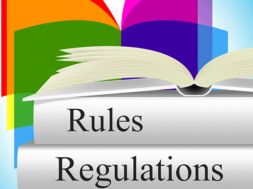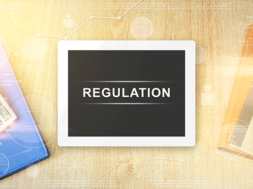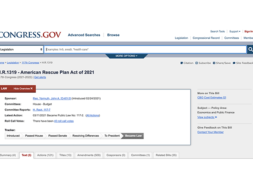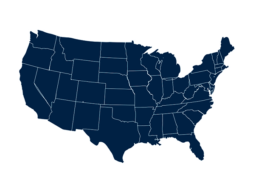
Too Good to be True? Yes. The Student Loan “Relief” Scam
By Katherine (Kate) Lee Carey, Special Counsel, Cooley LLP
Not long ago, I received a message via Facebook Messenger from my good friend Vic. He said he was enjoying a wonderful vacation golfing in Scotland – but had lost his wallet and his passport and was trapped at his hotel trying to figure out what to do. He asked if I could loan him $500 to get an emergency passport to get home. Now normally, Vic could ask me for a kidney and I would ask which one he wanted, but something about this didn’t seem right. First of all, Vic has four kids under the age of 10. And Vic drives a 1992 Honda Accord. Somehow, it seemed genuinely unlikely that he left his wife and kids at home to golf in Scotland. So I texted Vic and asked. His response indicated that he was at work in Denver, definitely not golfing. I called him and filled him in on his message asking for money. First he laughed at the very idea of affording a trip to Scotland, but then became very concerned that someone less suspicious than I might have been targeted. As it turns out, someone hacked his Facebook account and had sent the same message to a number of his friends, preying on their relationship with Vic in hopes of making a few dollars (or Euros, as the case may be.) A couple of them were actually in the process of figuring out how to get him the money when he notified them about the scam.
The moral of the story is twofold: 1) someone with four kids who drives a 25 year old Honda is probably not golfing in Scotland, and 2) Internet scammers will use the information they can gather about you to target their messaging, to prey on your feelings, your relationships, and your situation, in an effort to defraud you.
As our reliance on the Internet and involvement in social media grow, so too do the data collection activities tied to everything we share. And there is an entire world of savvy data collectors who are targeting us every day based on the collection of our likes and dislikes, our searching and buying activity online – with ads embedded in our social media accounts and in banner ads appearing every time we open a browser.
While there is nothing illegal about data collection, in fact you consent to it as part of the terms of use agreement with essentially every site you visit or app you use, targeting you for an ad about local pre-schools right after you order diapers for your friend’s baby shower can definitely feel creepy (especially if you don’t have kids). The same methodology is often employed for more nefarious purposes, and one of the newest scams targets people with promises of “student debt relief” that is actually not “relief” at all – in fact the “services” can drive you further into debt.
And institutions are feeling the ripple effect because often the scam involves dragging institutions through the mud in the process.
The hook
Most likely, somewhere in one of your social media profiles, you have listed your alma mater, or your employment with an institution, or you have “liked” or “followed” a college or university. One day, you see a “suggested post” or “promoted ad” that says (for example) “Students of the University of (insert your school name here) are Qualifying for Student Loan Forgiveness!” or “Access the Obama Loan Forgiveness Program!” You click on the story which takes you to a website with some seemingly legitimate sounding name like “Student Defender,” “Student Debt Relief” or “Student Advocates.” A few have “.us” Web addresses that make them appear to be somehow affiliated with the federal government. They use words in their ads that imply that they are debt “counselors.” The page looks like it has important and valid information about loan programs and offers an “instant quote” and a “free assessment” to determine what programs you qualify for. So, what is really going on? These scammers are preying on your financial struggles citing a “debt relief” program that doesn’t actually exist, or they describe a government program and make it sound like it’s their own or claim to have some special way to access it.
As it turns out, if you provide your contact information, you will probably receive a call from someone claiming to be a “debt counselor” who will then offer to help you by charging you $500 (or $1000 or $2500) to assist you in applying for a federal loan relief program. What they fail to mention is that anyone can apply for those programs, for FREE. Unfortunately, many people don’t know that these options are available, and they get suckered in. Worse yet, eligibility for many of the federal programs is not guaranteed, so that $2,500 could pay for nothing more than an application that will lead nowhere, or they push the student into a consolidation loan outside of the federal loan system that is not the student’s best financial option.
Another version of this scam, which can be even more catastrophic for someone struggling with loan debt, uses the information provided by the student in the “application” process to steal the student’s identity.
The small print
Interestingly, many of these sites have identical language on the bottom of the page. This tiny print is telling. Here is an example from one site:
Disclaimer
We do not intend this information to be legal advice. By providing this information, we are not acting as your lawyer. If you need legal advice, you should contact a lawyer. Statute of limitations and regulations may vary state by state. THIS IS AN ADVERTORIAL AND NOT A NEWS ARTICLE, BLOG, OR CONSUMER PROTECTION UPDATE. This is a paid attorney/advocate advertisement. This website is a group advertisement and a fee is paid for by participating attorneys and advocates. The site is not an attorney referral service or prepaid legal services plan. The site is privately owned and is not affiliated with or endorsed by the Social Security Administration, Department of Education, or any other government agency.
What does this actually mean? That this particular site (and many others with the same language) are actually serving two purposes: 1) to make money off of people who are struggling with student loan debt by charging a fee for a service, and 2) to generate potential clients for “participating attorneys and advocates” who are seeking to turn a student’s dissatisfaction with their educational experience into a lawsuit.
The easy target
Targeting the demographic “people with student loan debt” is probably the easiest marketing maneuver in the country right now. The media has spent the past five years talking about the rising cost of college, and the “student loan debt bubble.” An entire faction of the “Occupy Wall Street” movement is devoted to the issue of student loan debt. Presidential candidates are making student debt and college costs part of their election platform. Unless you are one of the lucky few who went to school on scholarship or had parents with the financial means to pay for your education, you are likely in the population that has some student loan debt. And if you are one of the unlucky few who took out loans to cover all of the costs of your education, that debt may be overwhelming. The appeal of relief from that burden is an easy sell. And the scammers know that.
Now, with the closures of institutions and the publicity surrounding the “Borrower Defense to Repayment” option, these folks have yet another “service” to offer.
Using negative press
It will come as no surprise that these scammers are framing their “bait” based on what is hot in the media: the for-profit school sector. At the same time that the media has focused on the student loan “debt crisis” they have often attributed it to the for-profit sector, as if it is solely to blame for the crisis. This storyline, paired with the relentless scrutiny of the federal government, the increased media attention, and school closures, and it’s a no-brainer for a savvy scammer to pair the debt crisis with for-profit schools.
In a lot of cases, if you click through the targeted “suggested posts” that mention a specific school by name, there will be a “news” story about the school – how students were promised jobs that never materialized, how they were drowning in debt – with quotes from an unidentified student about how the school had not lived up to its promises. These stories are cookie-cutter and completely false. If you spend a few minutes on the site, clicking on other supposed news stories, you will find the exact same story, almost verbatim, repeated, with a different school’s name and different programs mentioned.
But this is an equal opportunity scam. Although for-profit schools seem to be seeing the lion’s share of these defamatory articles, the click bait is not always school specific. You may have seen banner ads that say things like “Obama Wants to Pay Off your Student Loans!” or “Student Loan Relief is Available Now!” These ads don’t mention any institution by name, but they are playing on the law of averages: enough people have student loan debt that even a random ad will likely get “clicks.”
What schools can do to protect students
The simplest tactic is to be proactive. At least three State Attorneys General (Illinois, Minnesota and Florida) and the Consumer Financial Protection Bureau have filed enforcement actions against student debt relief companies based on this scam.
Make your faculty, staff and most importantly, your students, aware of this. Describe the scam and the actions being taken by the authorities to stop them.
Post a notice about it on your student portal, or signs on campus where students congregate. Equip your Financial Aid Office with information to hand out to students. The more your employees and students know about this scam, the less likely that they will fall prey to it.
Here are a few of the resources you can use to educate yourself and your campus:
- https://studentaid.ed.gov/sa/about/announcements/debt-relief-message
- http://www.consumerfinance.gov/blog/consumer-advisory-student-loan-debt-relief-companies-may-cost-you-thousands-of-dollars-and-drive-you-further-into-debt/
Advise your staff, faculty and students not to click on any ad that claims to offer student debt relief. Sites and postings with a higher volume of views will actually move up the search results in various search engines. By clicking on these links, you are actually making it easier for these scam artists.
Also, provide thorough and complete financial entrance and exit counseling to be sure students and graduates understand their options when it comes to their loans. Make sure students know that they never have to pay to apply for federal student loan relief programs offered by the U.S. Department of Education.
The Department has an entire page committed to explaining debt relief programs. If a student has questions about what options are available, you can refer them to:
https://studentaid.ed.gov/sa/repay-loans/forgiveness-cancellation.
When the target is your school
Things get slightly more complicated when one of these scams is targeting your students with false stories about your institution. When a student or graduate receives a targeted ad that mentions your school’s name, alleging that you have somehow misled students, the reaction is just what you would expect: confusion and anger.
And false stories about your institution can trigger negative press, bad PR and potentially even a regulatory investigation. Responding to these situations can be difficult.
If the source of the ad was a social media platform, you can contact the administrator and request that the offending ad be removed. This can prove difficult, because generally the banner ad or social media post will not include trademarked or copyrighted material, or information that is defamatory on its face. Social media platforms do not generally remove posts or pages unless there is a solid underlying legal theory, so this option may be a long shot.
The next challenge is often establishing who “owns” the site. Not surprisingly, those who are charging for assistance applying for federal programs, in direct contravention of the law, are not forthcoming about their identities. It often takes some serious detective work to determine the company or person that set up the site. Using the URL address, you can search the whois database (www.whois.net) which may help you figure out which registry is hosting the site, you can then search that registry for the registrant of the Web address. The registrants are often just shell companies using P.O. boxes and without any names or physical locations to help narrow your search. Sometimes that shell company, or the registrant providing the server on which the site is located, are your only contact options. If you can identify the website registrant, or better yet, the actual human owner, then what?
The next steps will probably require the assistance of your legal counsel, as the options remaining are primarily rooted in legal actions. The issues your attorney can pursue include a Cease and Desist letter; Trademark or Copyright violations (does the ad, story or post include your trademarked logo? name? photos?) which can be the basis for a suit under U.S. trademark law or the Digital Millennium Copyright Act (DMCA); if the story includes falsehoods about your institution, there may be a basis for a defamation, libel or consumer fraud claim; and, if the ad or story indicates that the advertising entity is a law firm or attorney (as the Disclaimer above noted), it could violate the professional responsibility and ethics requirements of relevant state bar associations. If not, the advertising entity may be acting illegally by holding itself out as a law firm.
In addition, your attorney (or your institution) can report the entity to the Consumer Financial Protection Bureau, state consumer protection agencies, the Federal Trade Commission, or the Federal Bureau of Investigation Cyber and Criminal Investigative Divisions.
In many cases, an initial Cease and Desist letter will work. If the letter includes all of the various legal violations that can be pursued against the registrant, the threat alone can spur some action. If not, your institution will need to evaluate the costs and benefits of pursuing legal action and make an informed business decision.
In the end
There doesn’t seem to be any way to avoid being targeted with a scam like this. Despite the CFPB and Department of Education publically pursuing these “debt relief” companies, they continue to pop up every day. As long as student debt exists (and continues to grow), there will be someone trying to prey on the desperation of those who struggle to pay it. But your institution can take a number of steps to protect itself and its students from becoming victims.

Katherine Lee Carey (Kate) is Special Counsel in the Education practice group of Cooley LLP. Prior to joining Cooley, Kate spent close to 15 years serving in numerous roles in higher education institutions, including the most recent seven years as General Counsel and Vice President for Government Affairs. Previously, Kate served as the Vice President of Compliance and Assistant Director of Regulatory Affairs for two other higher education institutions.
Kate’s practice focuses on the legal, accreditation, administrative and regulatory aspects of higher education institutions and companies that provide services to the education industry. She provides clients with practical interpretation and implementation guidance on legal and regulatory requirements, assistance in preparing for regulatory and statutory changes, and impact analysis and strategic plans to implement complex regulatory requirements and compliance structures.
Kate also serves on the Advisory Board for the California BPPE, is Vice Chair of APSCU’s Federal Regulatory Affairs Committee, serves on APSCU’s Litigation and HEA Reauthorization committees, as well as the Diverse Women’s Committee of the San Diego Lawyer’s Club. She previously served on the Board of the California Association of Private Postsecondary Schools (CAPPS).
Contact Information: Katherine (Kate) Lee Carey // Special Counsel // Cooley LLP // 858-550-6089 // kleecarey@cooley.com // www.cooley.com










